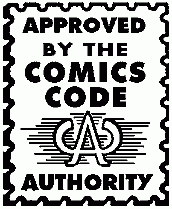Lets lay out the major players in this simple story:
The Comic Book Legal Defense Fund was founded in 1986 to work for the benefit of comics creators, publishers, and retailers by covering their legal expenses in the event that they came under fire for exercising their first amendment rights. Basically, they’re anti-censorship; their biggest cases concern comics artists and retailers who have been prosecuted for owning, creating, or selling comics that have “objectionable” content. Content like brief nudity or other things that fall under obscenity clauses, and for which comics-involved people are sometimes prosecuted by administrations that forget or are unaware that comics are a medium like any other, and can thus be used to, you know, make art or communicate.
The Comic Code Authority is a half-century old organization created by several of the biggest comics publishers in 1954, ostensibly to create a code of standards for the industry that would mollify the United States Senate and many parents who had come to the conclusion that comic books were directly responsible for juvenile delinquency. At least, that was the intent.
In practice, the Comics Code was a de-facto censorship board for almost twenty years, until it was liberalized. If you’ve ever looked at those nuts covers from DC Comics in the 60s and wondered what the heck the writers thought they were doing, it’s precisely because of what they couldn’t do.
Max Eddy of Geekosystem explains:
The CCA would later become famous for its strangely specific, draconian rules, such as:
- In every instance good shall triumph over evil and the criminal punished for his misdeeds.
- No comic magazine shall use the word horror or terror in its title.
- All lurid, unsavory, gruesome illustrations shall be eliminated.
- Females shall be drawn realistically without exaggeration of any physical qualities.
- Sex perversion [translation: homosexuality] or any inference to same is strictly forbidden.
And my personal favorite:
- Scenes dealing with, or instruments associated with walking dead, torture, vampires and vampirism, ghouls, cannibalism, and werewolfism are prohibited.
These rules, and the fact that many mom-and-pop stores or newsstands, fearing backlash (like, you know, more book burning) would not purchase comics unless they had the Comics Code logo, drove a number of publishers out of business. Naturally, these out of luck publishers were primarily the biggest competitors of the publishers who put together the Comics Code, like EC Comics, the birthplace of Tales From the Crypt and Mad Comics, the latter of which managed to survive by adding articles and converting to Mad Magazine.
However, after being liberalized repeatedly from the 1970s on, the practice of submitting issues for Comics Code approval has since been formally abandoned by every comics publisher in America. Marvel led the pack by far in 2001 (it was their 1971 Amazing Spider-Man #96 that was the first issue from a participating publisher to go to print despite being denied CCA approval), but was followed in 2010 by Bongo Comics, and in this year by DC and Archie, leaving exactly, uh, nobody asking the CCA for their approval anymore.
They must have been feeling pretty lonely. But it seems that the Comic Book Legal Defense Fund stepped in to give them a little attention. I’m sure that now they own the rights to use the CCA’s iconic and historic stamp, it will totally not be used to make funny shirts sold for charity.
(via Bleeding Cool.)








Published: Sep 29, 2011 04:16 pm